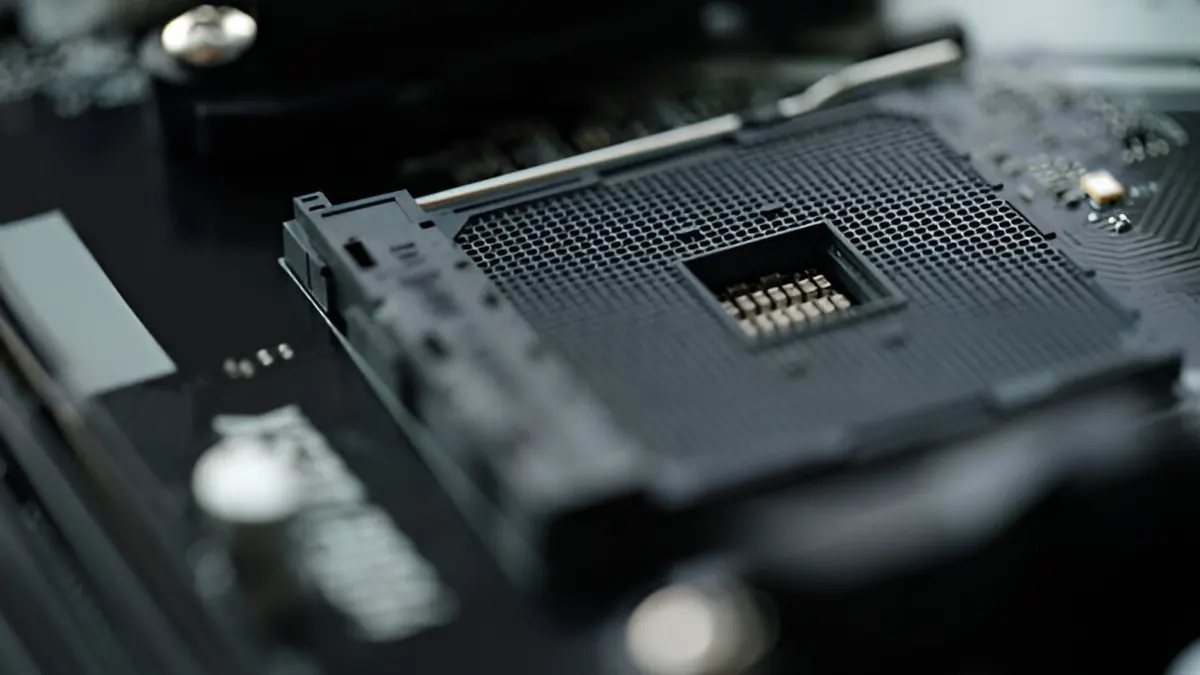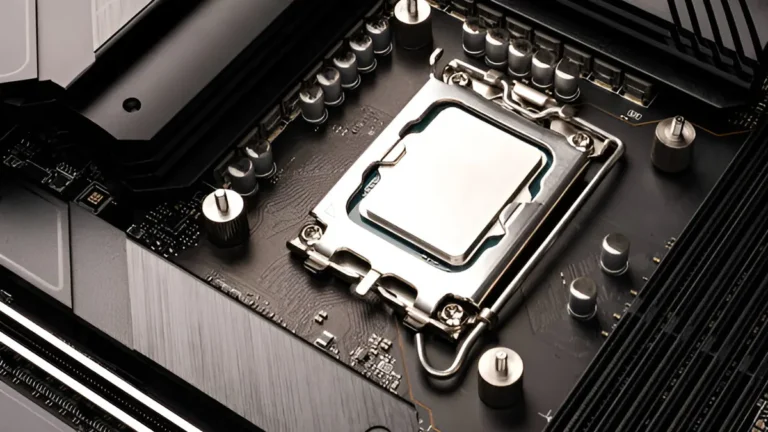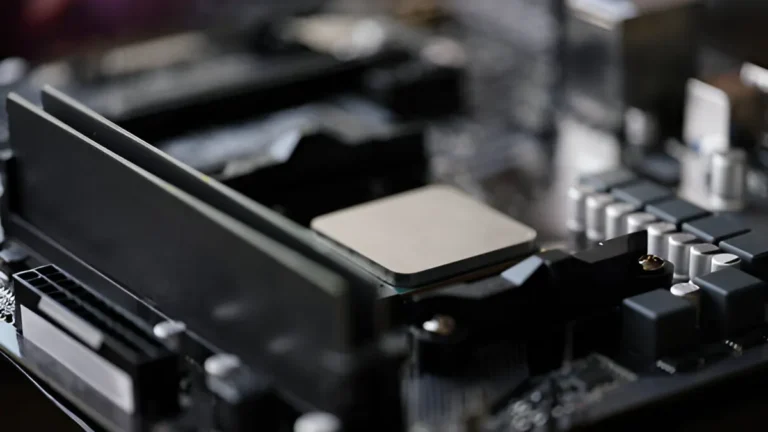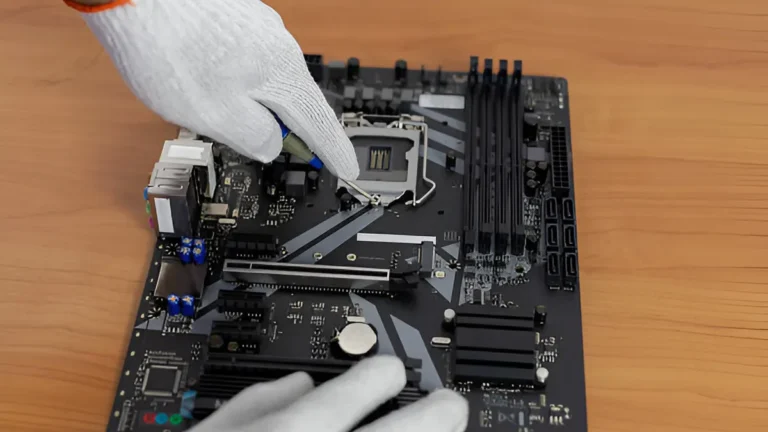Motherboards are the primary circuit boards that connect the CPU, GPU, RAM, and storage devices directly. High-end X570 motherboards feature up to 16-phase VRMs, PCIe 4.0 lanes, and support for 128GB DDR4 memory. Motherboards allow other components to operate at their full potential, though advanced features often come at a higher cost.
The Ryzen 7 5700X was released in Q1 2022 at a retail price of $299 compared to the $399 Intel Core i7-10700K. The Ryzen 7 5700X uses an 8-core, 16-thread configuration with a 65W TDP and up to 4.6 GHz boost clock. It outperforms the i7-10700K even at stock speeds, scoring around 12,028 points in Cinebench R23 multicore versus 11,045 on the i7-10700K. By mid-2023, the average market price dropped to $192, making it a strong value in both productivity and gaming workloads.
Stable power delivery is essential for this CPU to perform at maximum capacity. Weak VRMs or inadequate cooling can lower boost clocks by 200–300 MHz, reducing gaming performance by up to 8%. Compatible chipsets include B450 (entry-level, limited PCIe 3.0 bandwidth), B550 (mainstream, PCIe 4.0 GPU and SSD support), and X570 (high-end, stronger VRMs, full PCIe 4.0 support). The specific variant of the chipset also matters since vendors like ASUS, MSI, Gigabyte, and ASRock design boards for different budgets.
Examples of compatiable motherboards include Gigabyte AORUS Master (X570), Gigabyte AORUS Xtreme (X570), ASUS ROG Strix B550-F, MSI MEG ACE (X570), and ASRock Steel Legend (B550). High-end boards ensure stable overclocking and PCIe 5.0 readiness, while budget boards balance affordability with essential features such as PCIe 4.0 SSD lanes and adequate VRM cooling.
GIGABYTE B550 AORUS MASTER
Pros:
- Eye-catching design.
- Excellent RAM and CPU OC capacity.
- Onboard WiFi 6 capability.
- The price isn’t absurd.
- Offers 2.5Gb Lan.
- Comes with PCI-E Gen4.
Cons:
- Compatibility ends with 5000 series processors.
The B550 AORUS MASTER is one of the few B550 chipset motherboards that delivers premium specifications while remaining in the mid-range price bracket. The motherboard is priced at $260, and when paired with the Ryzen 7 5700X, priced at $192, it forms a strong performance-focused combination. The new AM5 motherboards are priced higher on average, making AM4 options like the B550 AORUS MASTER a cost-effective alternative.
This motherboard features extended aluminum heatsinks with a geometric design and integrated RGB lighting on the rear I/O shroud. The voltage regulator module (VRM) design includes 16 digital power phases, which are sufficient for stable overclocking of the Ryzen 7 5700X and even the Ryzen 9 5900X. The board also supports DDR4 memory overclocking up to 5400 MHz (OC).
Moreover, the B550 AORUS MASTER integrates WiFi 6 connectivity and multiple USB 3.2 Gen2 Type-A and Type-C ports, while USB 2.0 ports remain available for compatibility. For storage, the motherboard provides one PCIe 4.0 NVMe slot and two PCIe 3.0 NVMe slots, allowing users to expand high-speed storage without relying on SATA hard drives or 2.5-inch SSDs. The B550 AORUS MASTER is positioned as a balanced motherboard that offers both performance and long-term value for Ryzen 5000 processors.
ASUS ROG Strix X570-I Gaming
Pros:
- It is compatible with any chassis.
- Adequate OC, even though it’s compact.
- ARGB lighting is still present.
- Fast 6th-gen WiFi.
- 4th generation PCIe x16 expansion.
- Decently priced considering its form factor.
Cons:
- 2 RAM slots might become an issue for some developers.
Every chipset has at least one Mini-ITX form factor variant for those in need of compact builds or enthusiasts of small-form-factor PCs. Usually, Mini-ITX motherboards are priced higher, the same is the case with most Mini-ITX cases. This ASUS ROG Strix X570-I Gaming motherboard is priced at $280. The price is considered high for mainstream users but acceptable for Mini-ITX buyers.
This Mini-ITX board provides two DDR4 DIMM slots to qualify for the Mini-ITX specification and can support up to 64 GB of memory at a maximum speed of DDR4-4800 MHz with XMP enabled. Not just the memory overclocking is notable – the CPU overclocking is supported too, with its 8+2 phase VRM design that delivers stable power for processors like the Ryzen 7 5700X. Besides that, all of those VRMs are adequately cooled for long-term stability and efficiency.
Being smaller in size does not mean fewer features, because this board includes rear I/O and storage options comparable to Micro-ATX or ATX motherboards. It features four USB 3.2 Gen2 ports, four USB 3.2 Gen1 ports, and one PCIe 4.0 x4 NVMe slot on the X570-I Strix. This gives a wide range of connectivity for devices such as external SSDs, VR headsets, or gaming peripherals. This board offers compact dimensions with premium performance, making it a solid base for the Ryzen 7 5700X.
ASRock B550M Steel Legend
Pros:
- mATX form factor allows for better compatibility.
- Offers decent OC headroom.
- Highly affordable pricing.
- PCIe 4 x16 is present for the GPU.
- 2x PCIe x4 for faster storage.
- 2.5 Gigabit LAN.
Cons:
- No Bluetooth and WiFi.
mATX is a widely used form factor for motherboards because it fits most PC cases except mini-ITX. The ASRock B550M Steel Legend is one such motherboard that balances cost and features effectively. The motherboard costs $138 USD, which is an affordable mid-range price point. But such affordability was only achieved by cutting some corners, like the lack of integrated Bluetooth and Wi-Fi modules. However, that limitation is minor since many users prefer the Ethernet LAN port for stable latency and speed.
Making the motherboard more affordable also means making it less feature-rich than the ATX version. This is why we get 10-phase DrMOS VRM power delivery instead of the 16-phase design on the ATX Steel Legend. These 10 phases are sufficient to support the Ryzen 7 5700X’s 105W TDP and allow moderate overclocking. The motherboard also supports memory overclocking up to 4733 MHz, enabled by the stable VRM solution.
Lastly, for the features, the motherboard has standard I/O ports, including USB 3.2 Gen2 Type-C and USB 3.2 Gen1/Gen2 Type-A ports that provide up to 10 Gbps transfer speeds. The same can be said for the integrated Realtek 2.5 Gbps LAN controller. Since we’re talking about fast transfers, storage support is also notable. Here we get two M.2 PCIe x4 slots for NVMe SSDs, with one slot supporting PCIe 4.0 and the other PCIe 3.0, making it suitable for both primary and secondary drives. The motherboard is a great budget pick for the Ryzen 7 5700X for those looking to build a compact mATX system.
ASUS TUF GAMING X570-PLUS WIFI
Pros:
- Armory-themed looks.
- Available VRMs are good enough for high OC.
- The price is fair and square.
- Latest BT5 and WiFi6.
- PCIe 4.0 storage and GPU.
- Dual RGB headers.
Cons:
- Lan only goes up to 95MB/s.
ASUS TUF GAMING X570-PLUS WIFI is a mid-range ATX motherboard that one could get without paying a hefty sum. This motherboard costs $210 USD (average retail price in 2025), which is a reasonable price for an X570 flagship chipset with competitive features. The only notable drawback in this motherboard is the absence of a 2.5GbE LAN port. Otherwise, everything else is a functional advantage.
The VRM design uses a 12+2 digital phase power delivery system with extended heatsinks. This configuration helps to overclock the Ryzen 7 5700X to a stable level. The motherboard supports DDR4 memory overclocking up to 5100 MHz (OC) across four DIMM slots. It is based on the ATX form factor, which requires a mid-tower or full-tower case and does not fit ITX or mATX enclosures.
Feature-wise, the motherboard includes dual ARGB headers to sync RGB fans, coolers, and other peripherals. It provides two PCIe 4.0 M.2 slots (x4 mode) for NVMe SSDs and one PCIe 4.0 x16 slot for modern GPUs. This motherboard is a solid option for the Ryzen 7 5700X because it offers stable power delivery, high memory speeds, and PCIe Gen4 compatibility.
MSI MAG B550 TOMAHAWK
Pros:
- Excellent VRM module.
- The same thermal solution as the more expensive Unify variant.
- Excellent value for money board.
- Good enough PCB for PCIe 4.0 compatibility.
- Fast 2.5 Gbps LAN.
- Lots of Gen2 and Gen1 ports.
- CPU flashback button.
Cons:
- WiFi is not an option here.
The MSI MAG B550 TOMAHAWK is a budget ATX motherboard designed for gaming builds. This B550 variant of the MSI TOMAHAWK is priced at $169.99 and is built with a 6-layer PCB for durability and PCIe Gen4 support. One limitation is the lack of integrated Wi-Fi and Bluetooth connectivity due to cost reduction.
The MSI MAG B550 TOMAHAWK’s PCB is built with 6 layers, enabling PCIe Gen4 compatibility. In contrast, entry-level models such as the MSI MPG B550 Gaming Plus show weaker PCB endurance. VRM-wise, the board uses 12+2 power phases with 60A DrMOS stages, which are sufficient for stable overclocking of the Ryzen 7 5700X. For cooling, the VRMs are covered with extended heatsinks similar to the MSI B550 Unify. Memory support reaches DDR4-5100MHz (OC) with a single DIMM, while in dual-channel configuration, the stable frequency is DDR4-4000MHz (OC).
For onboard audio, the motherboard integrates the Realtek ALC1200 codec, which is considered mid-range and provides 7.1-channel HD audio output. Connectivity includes USB 3.2 Gen2 Type-A, USB 3.2 Gen2 Type-C, multiple USB 3.2 Gen1, and USB 2.0 ports for peripheral expansion.
In conclusion, the MSI MAG B550 TOMAHAWK is a strong sub-$200 choice for Ryzen 7 5700X and other AM4 CPUs, combining robust VRMs, Gen4 support, and reliable audio performance while missing Wi-Fi and Bluetooth.
ASUS ROG STRIX B550-E GAMING
Pros:
- Top-of-the-line power delivery solution.
- Enhanced PS and choke cooling.
- Over 4GHz speed on all 4 memory slots.
- Sturdy build to give benefit to the PCIe 4.
- Rapid LAN port with 2.5Gbps.
- Many swift Type A and C plugs.
- BIOS flashback button.
Cons:
- A little expensive.
ASUS ROG STRIX B550-E GAMING is a premium ATX motherboard for the AMD B550 chipset, and with a price tag of around $335 USD, buyers expect advanced features from it. Just like many other high-end models, this one also features a 2.5Gbps Ethernet LAN as well as WiFi 6 (802.11ax) with up to 2.4Gbps speed for fast internet usage.
Now focusing on its power delivery system, we get 16 power stages rated at 50A each, with 7 phases dedicated to the CPU. This design can withstand heavy overclocking, supported by an extended heatsink cooling system for VRMs and chokes. With this VRM system, the motherboard can stably run DDR4 memory at 4000 MHz+ with all DIMM slots populated, which is significant since many B550 motherboards cannot reach this frequency when fully loaded.
Going further into the specifications, we get to see a USB Type-C front panel connector along with high-quality audio output ports. The integrated SupremeFX S1220A audio codec benefits from the 6-layer PCB design, where both channels are isolated across different layers to minimize interference and deliver clearer sound quality.
So, that’s the detailed overview, and this motherboard is suitable for Ryzen 7 5700X users who also plan to upgrade to a Ryzen 9 5950X, thanks to its robust VRM design and extended connectivity support.




